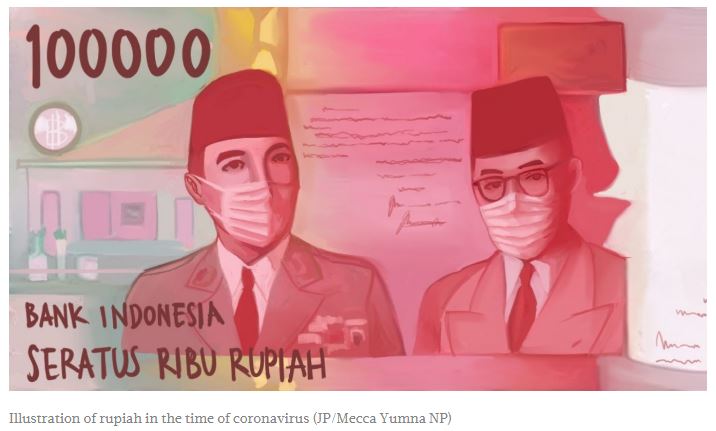Indonesia: Govt tweaks stimulus budget to include funding for sovereign wealth fund, food estate program
The government has once again adjusted its Rp 695.2 trillion (US$47 billion) pandemic stimulus to include funding for a sovereign wealth fund, vaccine procurement and a food estate program, among other things.
Rp 15 trillion will now be allocated to the sovereign wealth fund and Rp 16 trillion as early funding for vaccine procurement, according to the Finance Ministry.
The government has also set aside Rp 5.5 trillion for internet subsidies to support online schooling, Rp 5.02 trillion as aid for honorary teachers, Rp 4 trillion for a food estate program and an additional Rp 2 trillion in capital injections for state-owned pharmaceutical company PT Bio Farma, among other new allocations.
“The government has readjusted the budget again to include early funding for vaccines, internet subsidies and the sovereign wealth fund, among other things, which will allow it to accelerate budget disbursement,” Finance Ministry budgeting director general Askolani told The Jakarta Post on Wednesday.
“The government has also prepared [Rp 4 trillion] to open up land in Central Kalimantan, which is the main focus of the food estate development.”
He added that the government would try to maximize spending this year to support the economy.
The government has spent Rp 361.5 trillion or 52 percent of the stimulus budget in nine months since the start of the outbreak, with the highest spending going to social protection programs and support for micro, small and medium enterprises (MSMEs), according to ministry data.
President Joko “Jokowi” Widodo has repeatedly urged his ministers to accelerate state budget spending to help jack up the cooling economy, with the pandemic continuing to disrupt business activity and affecting the people’s purchasing power. Economists, business leaders and medical workers have criticized the government for the slow budget disbursement.
The COVID-19 pandemic has spurred government spending, sapped tax revenue and necessitated borrowing as the government expects a 6.34 percent budget deficit this year, more than half of the initial legal ceiling of 3 percent.
Indonesia fell into recession after its gross domestic product (GDP) shrank 3.49 percent in the third quarter and contracting 5.32 percent in the second quarter. It is the country’s first economic recession since the 1998 Asian financial crisis.
Finance Minister Sri Mulyani Indrawati said on Wednesday that rising government spending helped minimize the negative effects of the pandemic but warned that the health crisis would continue into next year.
“Even though vaccines may be [ready] by early 2021, it would be impossible to vaccinate Indonesians immediately. Therefore, the government’s efforts to control the pandemic and the public’s compliance [of health procedures] will be the key to a faster recovery,” she said.
Center of Reform on Economics (CORE) Indonesia economist Piter Abdullah told the Post that the government stimulus would be able to prevent the further weakening of people’s purchasing power, adding that swift budget disbursement would be crucial to support individuals and businesses suffering from the effects of the economic downturn.
“The new stimulus allocation, which includes financing for the sovereign wealth fund and food estate program, may help prepare economic recovery after the pandemic subsides,” he said on Wednesday.
Separately, Indonesian Chamber of Commerce and Industry deputy chairwoman Shinta Kamdani urged the government to speed up the disbursement of financing for large corporations, adding that it would be crucial for businesses suffering from weak demand amid the pandemic.
Source: https://www.thejakartapost.com/news/2020/11/05/govt-tweaks-stimulus-budget-to-include-funding-for-sovereign-wealth-fund-food-estate-program.html


 English
English




